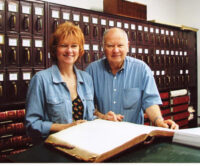I’m hard-wired for formal prayer. I find myself reciting the Our Father when an earthquake hits, and oftentimes at night as I go to sleep. “How weird,” I think, stopping in the middle, but then a Hail Mary (a woman about whom I hold equally wobbly beliefs), arises to take its place. I surrender, finish the prayer, then move on to blessing my family, my friends, and finally the people who irritate me. Some nights I cut to the chase and bless the ones I seriously want to smack upside the head. So much for being spiritual.
Both of my grandmothers were Catholic, stubborn, and right. I’m very much like them, though I don’t know why I still refer to myself as Catholic. I’m addicted to being right — a first cousin to being perfect, both of which have a tendency to be corrosive in relationships. Resentment is in my DNA, my cellular memory, creeping through generations, across lines, round the corners and back again, much like my Grandma Nellie Chatfield, who, the higher she stood on her moral ground, the lower her family descended. When Grandpa Charlie (who had the propensity to err) died, the only thing she had to say was: “serves the damn fool right,” then she buried him in an unmarked grave in the non-Catholic section of the cemetery. Now that’s mad.
It’s hard to restore family grace if there wasn’t much there to begin with, though it does make for good storytelling. C’mon, who’s captivated by tales of Catholic farmers with a passel of kids who worked the same land for generations and never broke the rules? They lend stability via my paternal side (for which I’m exceedingly grateful), but offer little of interest to write about. Fiction is too complicated for me to create, and really, why bother when my maternal lines teem with an overabundance of characters that supply me with endless material. I’m fascinated by these folks (while at the same time rather appalled at their bad behavior) and couldn’t make most of it up if I tried: I have missing mothers, though they do generally reappear. There are four generations of mothers in my direct line who, with infants or young children in tow, left their husbands; I am the last of that tradition. Actually, my mother didn’t leave with her children, she just took her coat and two suitcases.
I’ve stories that make for compelling page turners: drugs, pills, prison, murder, kidnapping, rape, abortions, child abuse, molestation, neglect, asylums, shock treatments, and suicides. I also have murders, poisonings, cattle thieves, liars, embezzlers, bookies, bettors, bootleggers, moonshiners, and drunks. I have a grandfather who gambled away the ranch (that’s one of the reasons Grandpa Nellie never forgave Grandpa). I have gay elopements (in May of 1889, Ora Chatfield (age 15), ran off with her cousin Clara Dietrich (age 28), the postmistress and general storekeeper of Emma, Colorado (you can look it up). I have racism (you’d be horrified; I am), a John Bircher, and a Scientologist. And that’s just on my mother’s side—though I notice that several of us have married into similar lines—cementing our proclivity to chaos. I don’t have to ponder what to write about; I have to ponder what NOT to write about.
What can I do in the family to counteract our genetic umbrage? Exposing light on it—though writing about certain things tends to irk some when it’s too close to home. I can do my part to not perpetuate conflict. I know how hard it is though: I so often want to slap the other cheek, and I‘m not about to easily turn mine. I can counteract it by not living as if we’re not connected, and by holding the possibility that things can change. I can choose not to take sides. I can keep an eye on what I’m up to. I can make amends to those my shiv has wounded; “I’m sorry” goes a long way.
I believe in the ineffable power of prayer, though it’s presumptuous of me to suppose that I can decipher—in the grand scheme of things—to pray for what I think is best. Some say prayers can move mountains; however, that’s where my critical thinking raises its hairy head, seeking evidence.
The best I can do is to still my rattling mind, to sit in gratitude. To continue to silently recite as a reminder and a comfort: forgive us our trespasses, as we forgive those who trespass against—the sacred version of let it go, let it go, let it go—sometimes out of habit, other times with intention. Forgiving someone doesn’t mean forgetting what was done, it just means being able to stop pointing fingers and move on. We don’t have to have lunch together. Amen.





Go home and say three Hail Marys and two Our Fathers and one Oh Brother.
Great article, Cathy!